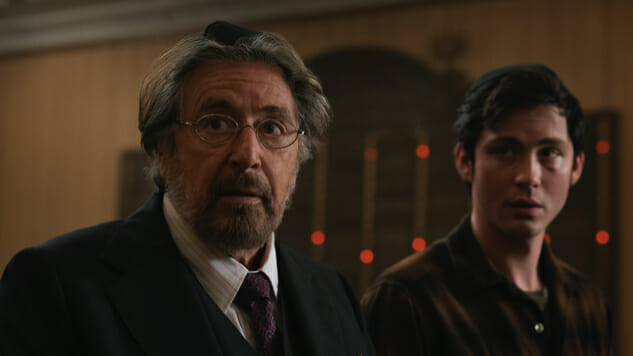Amazon’s Hunters Is an Unsatisfying Liberal Revenge Fantasy
Photo Courtesy of Amazon Prime
In May of 1960, Adolph Eichmann, the man who organized and oversaw the Holocaust, was approached after work by a man speaking Spanish as he walked from a bus stop to his home in Argentina. Eichmann was no fool, and he immediately suspected something was amiss, but it was too late—the Israeli intelligence operation had been in the works for three years, and soon three Mossad agents had wrestled him to the ground. They held him in a safe house for nine days before knocking him out with drugs, dressing him up like a flight attendant, and smuggling him back to Israel, where he stood trial and was finally executed by hanging in 1962.
In the broad details, it’s one of the great revenge stories of the Nazi era—the man most responsible for facilitating the murder of six million Jews had been found hiding out in South America and put to death for his crimes.
A closer look at the details, though, shows that it was more complicated than a comic book tale of good triumphing over evil, with certain outcomes that frustrated the thirst for pure, untainted comeuppance. For one thing, the “extradition” had some unhappy results. The capture was conducted without the knowledge or consent of the Argentine government, and resulted in anti-Semitic violence in that country carried out by far-right nationalist groups. It’s an awkward truth that more Jews were directly harmed as a result of Eichmann’s capture than would have been if he had never been caught and lived out an unremarkable life in Argentina. (Which, for the record, doesn’t mean the symbolic value of his capture wasn’t worth it … just that it came with terrible ripple effects.)
There’s also the ugly fact that came to light this century—the CIA and West German intelligence knew where Eichmann was living for years, and left him alone because they were afraid his eventual testimony would compromise former Nazis who were now helping the west in the Cold War against the Soviet Union. And what about the difficult choices Israel made? Part of the calculus of capturing Eichmann was choosing not to pursue the escaped Nazi doctor Josef Mengele—a far more sadistic and sinister enemy, if less impactful—since it would compromise the operation. Finally, Eichmann’s disposition at his trial left many unsatisfied—the writer Hannah Arendt coined her infamous phrase on the “banality of evil” while watching Eichmann testify. He was no more than a “desk murderer,” a jumped-up bureaucrat who looked and sounded like any uninspiring functionary. He wouldn’t even show remorse, insisting over and over that he was just following orders, all while admitting, as though it were the most boring of axiomatic truths, that he loathed the Jews.
The aftermath of Eichmann’s capture represents the reality revenge in the real world: It’s never quite as clean and thorough as we’d like, and it can’t reverse the pain of something as massive and monstrous as the Holocaust.
It may seem ridiculous to compare the Eichmann capture and its aftermath to a TV show, but I think it’s worth recognizing that Amazon’s Hunters—a show about a group of vigilantes in the 1970s who track down old Nazis and murder them—chooses to mostly ignore the messy humanity in notions of revenge in favor of a revenge fantasy designed to appeal to our simple thirst for justice. I emphasize the word “mostly” there because this isn’t quite Tarantino’s Inglorious Basterds, which fully embraces the gaudy mask of unrealistic vengeance and is therefore more authentic in its motives and more enjoyable in its execution. Hunters tries to straddle both worlds, appealing to our childish urge for uncomplicated cause-and-effect narrative while forcefully extracting pathos from one of history’s greatest atrocities. In doing so, the writers gesture limply in both directions and create something that is, from a moralistic standpoint, insipid.
Which is not to say you won’t enjoy it, at least a little. The two episodes I watched were not entertaining enough for me to keep going, but nor were they so dull that I felt the time spent was totally wasted. I’ve written before that there is a tendency among a certain type of liberal to view American politics as a comic book with arch-villains and superheroes doing battle in a realm somewhere above the reach of human influence. The desire for uncomplicated arcs culminating in the emphatic delivery of justice is of great appeal to this mindset, and it’s far less damaging to indulge that appetite through the means of a shallow TV show than through actual politics.
-

-

-

-

-

-

-

-

-

-

-

-

-

-

-

-

-

-

-

-

-

-

-

-

-

-

-

-

-

-

-

-

-

-

-

-

-

-

-

-








































